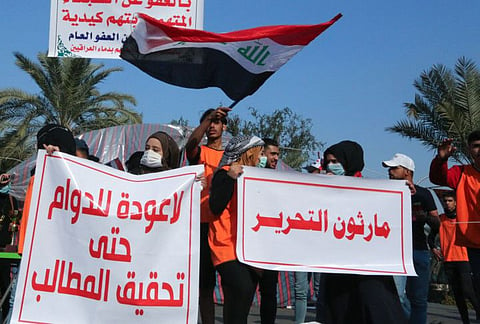Thousands protest in Iraq as deadline for new PM looms
Sunday is latest deadline for parliament to choose a new premier

Diwaniyah: Thousands of protesters blocked roads and public buildings in southern Iraq Sunday, as the latest deadline for choosing a new prime minister loomed.
Anti-government rallies have rocked Baghdad and the Shiite-majority south since October 1, with demonstrators calling for a complete overhaul of a regime they deem corrupt and inefficient.
“The revolution continues!” shouted one demonstrator at a protest encampment in central Diwaniyah.
Protesters blocked off public buildings one by one in the southern Iraqi city, and put up banners reading “The country is under construction - please excuse the disruption”.
Overnight, protesters in Diwaniyah and Basra, another southern city, had declared a “general strike”.
Sunday marks the latest deadline - already pushed back twice by President Barham Saleh - for parliament to choose a new premier to replace Adel Abdel Mahdi, who tendered his administration’s resignation last month.
Officials say neighbour Iran, a key player in Iraqi politics, wants to install Qusay al-Suhail, who served as education minister in the government of Abdel Mahdi.
But protesters categorically reject his candidacy, along with anyone from the wider political establishment that has been in place since dictator Saddam Hussein was deposed in 2003.
The protest movement has lost momentum in recent weeks as it has been hit by intimidation, including assassinations perpetrated by militias, according to the UN.
Around 460 people have been killed since the protests began nearly three months ago, and some 25,000 have been wounded.
But the movement appeared to regain some confidence on Sunday.
Dozens of protesters blocked roads linking southern cities to Baghdad with burning tyres, an AFP correspondent said.
In Karbala and Najaf, two Shiite holy cities, striking students closed schools and gathered in their thousands, AFP correspondents said.
In Nasiriyah, protesters blocked bridges and several roads while all public buildings remained closed.
Protesters are demanding the fall of Saleh and parliament speaker Mohammed al-Halbussi, accusing them of procrastinating.





